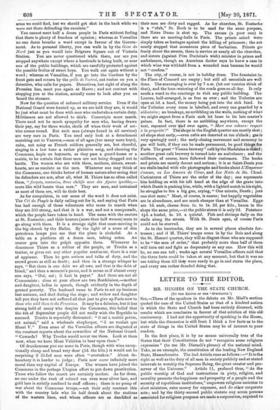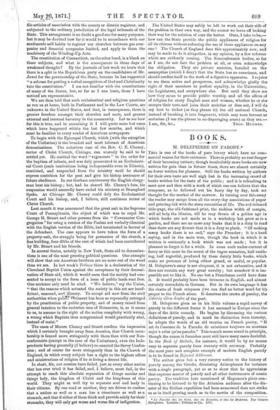LETTER TO THE EDITOR.
MR. HUGHES ON THE STATE CHURCH. [TO THE EDITOR OD THE " SPEOTATOR.1 SIR, —Three of the speakers in the debate on Mr. Miall's motions quoted the case of the United States as that of a kindred nation. in which the State and Church had been entirely divorced, with, results which are conclusive in favour of that solution of this old' controversy. I had not the opportunity of speaking in the House,. but while the discussion is still fresh I think a few facts as to the- state of things in the United States may be of interest to your readers.
In the first place, it is by no means universally true of the States that their Constitutions do not "recognize some religious expression " (to use Mr. Disraeli's phrase) of the national mind. Take, as an example, the constitution of the leading New England State, Massachusetts. The 2nd Article runs as follows :—"It is the right as well as the duty of all men in society publicly and at stated intervals to worship the Supreme Being, the great creator and pre- server of the Universe." Article 11, prefaced thus, " As the public worship of God and instructions in piety, religion, and morality promote the happiness and prosperity of a people and the security of republican institutions," empowers religious societies to elect ministers, raise money for expenses, and do other corporate acts ; and by the thirty-second public statute any seven persona associated for religious purposes are made a corporation, required to file articles of association with the county or district registrar, and subjected to the ordinary jurisdiction of the legal tribunals of the State. This arrangement is no doubt a good one for many purposes, but it may be doubted how far it would be in accordance with our sentiments anti habits to register our churches between gas com- panies and financial companies limited, and apply to them the machinery of the Winding-Up Acts.
The constitution of Connecticut, on the other hand, is a blank on these subjects, and what is the consequence in these days of awakened thought? By the journals of last week we learn that there is a split in the Republican party on the candidature of Mr. Jewel for the governorship of the State, because he has supported " a scheme for putting a verbal recognition of God and Christianity into the constitution." I am not familiar with the constitutions of many of the States, but, so far as I can learn, those I have noticed are representative.
We are then told that such ecclesiastical and religious questions as vex us at home, both in Parliament and in the Law Courts, are unknown in the United States, and that, in consequence, there is greater freedom amongst their churches and sects, and greater external and internal harmony in the community. Let us see how far this is true, and in examining it I will quote none but cases which have happened within the last few months, and which must be familiar to every reader of American newspapers.
To begin with the Episcopal Church, which (with the exception of the Unitarian) is the broadest and most tolerant of American denominations. The notorious case of the Rev. C. E. Cheney, rector of Christ Church, Chicago, can scarcely be said to be settled yet. He omitted the word " regenerate " in the order for the baptism of infants, and was duly prosecuted in an Ecclesiasti- cal Court (such institutions being indispensable even in Illinois), convicted, and suspended from the ministry until he should express contrition for the past and give his bishop assurance of future obedience. In our Gorham controversy the English clergy- man beat his bishop ; but, had he shared Mr. Cheney's fate, his suspension would assuredly have ended his ministry at Brampford Speke. At Chicago Mr. Cheney could defy the Ecclesiastical Court and his bishop, and, I believe, still continues rector of Christ Church.
Last month it was announced that the great suit in the Supreme Court of Pennsylvania, the object of which was to expel Mr. George H. Stuart and other persons from the " Covenanter Con- gregation " for using a version of the Psalms not verbally identical with the English version of the Bible, had terminated in favour of the defendant. The case appears to have taken the form of a property-suit, the struggle being for possession of the church, a fine building, four-fifths of the cost of which had been contributed by Mr. Stuart and his friends.
In several States, notably in New York, State aid to denomina- tions is one of the most pressing political questions. One example will show that our American brethren are no more out of the wood than we are. In last week's Tribune there is a declaration of the Cleveland Baptist Union against the acceptance by their denomi- nation of State aid, which it would seem that the society had con- sented to accept in the form of a lease of public lands rent free. One sentence only need be cited. " We believe," say the Union, " that the reasons which actuated the society in this act are insuf- ficient, unsound, and illusory. To accept aid now from the civil authorities when parr 1 &rtiment has been so repeatedly outraged by the prostitution of public property, and of money raised from general taxation to the sectarian uses of Romanists, is, as it seems to us, to assume in the sight of the nation complicity with wrong, a wrong which Baptists thus compromised would practically abet, instead of resist."
The cases of Messrs. Cheney and Stuart confirm the impression which I certainly brought away from America, that Church mem- bership is fenced more stringently with them than with our Non- conformists (except in the case of the Unitarians), even the Inde- pendents having generally (I believe) re-enacted the Savoy Confes- sion ; and of course far more stringently than in the Church of England, in which every subject has a right to the highest offices and ministrations of religion if he is living a decent life.
In short, Sir, our cousins have failed, just as every other nation that has ever tried it has failed, and, I believe, must fail, in the attempt to reach this absolute separation of things secular and things holy, the kingdom of Christ and the kingdoms of this world. They might as well try to separate soul and body in their citizens. By one road or another, they are driven to confess that a nation as well as a man has a conscience as well as a stomach, and that if either of them think and provide solely for their stomachs, they will only get worse and worse fits of indigestion.
The United States may safely be left to work out their side of the problem in their own way, and the sooner we leave off looking their way for the solution of ours the better. Ours, I take to be,— how can the State provide the public appliances of religion for all its citizens without enforcing the use of those appliances on any one ? The Church of England does this approximately now, and may be made to do it altogether, in my opinion, by a few reforms which are evidently coining. The Nonconformist bodies, so far as I see, do not face the problem at all, or Oen acknowledge the obligation. They are private societies, founded on the assumption (which I deny) that the State has no conscience, and should confine itself to the work of a digestive apparatus. I rejoice to see them active and prosperous, and acknowledge gladly the right of their members to perfect equality, in the Universities the Legislature, and everywhere else. But until they show me how they mean to provide public worship and all the offices of of religion for every English man and woman, whether he or she their tests and joins their societies or does not, I will do my best to tinker (as they phrase it) the old national Church instead of breaking it into fragments, which may soon become as sectarian (I use the phrase in no disparaging sense) as they are.—



































 Previous page
Previous page